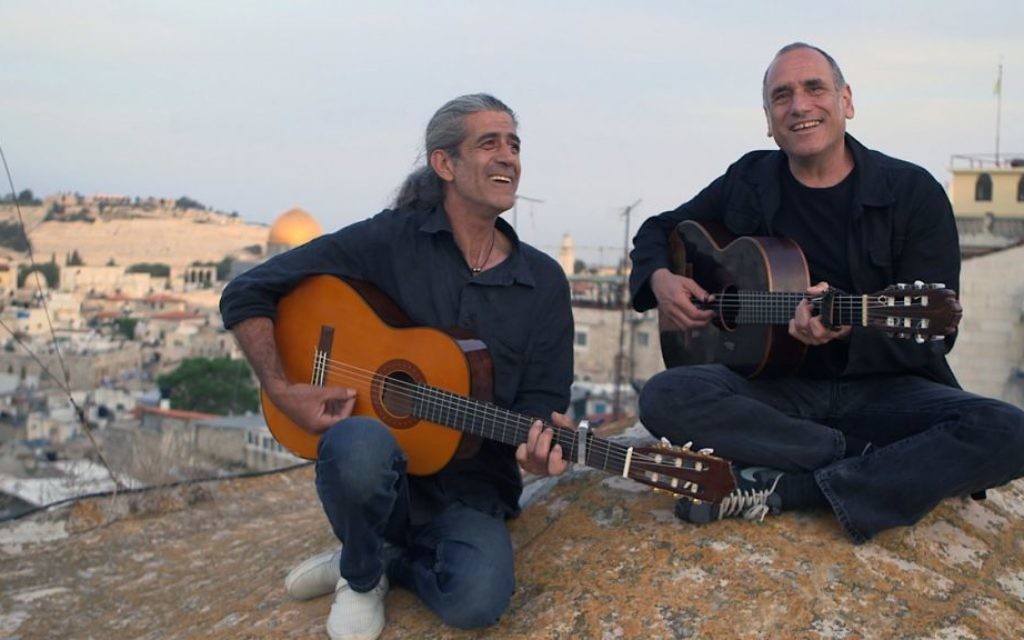David Broza Attempts Peace Through Music
East Jerusalem West Jerusalem strong in the studio but slips on the streets.

Wouldn’t it be great if Israelis and Palestinians could sort out all their differences through music?
That’s the prevailing thought behind David Broza’s film project “East Jerusalem West Jerusalem,” which is showing twice Thursday night, Jan. 30, at the Atlanta Jewish Film Festival, with Broza performing after each screening. The film chronicles the famed Israeli musician’s attempt to record an album in a small studio in East Jerusalem over eight days with a diverse mix of Israeli and Palestinian musicians.
The most compelling part of the film has to be the collaboration of the artists who join to make music just steps from the conflict in the streets below. Broza employs an all-star cast of musicians, including American recording artist Steve Earle, who produced the album; Israeli Arab singer Mira Awad; Haitian-American recording artist Wyclef Jean, who co-wrote the album’s title track with Broza; and Arab hip-hop duo G-Town from the Shuafat refugee camp in East Jerusalem.
Get The AJT Newsletter by email and never miss our top stories Free Sign Up
Despite a feel-good premise and some amazing footage of an animated Earle working in the studio with Broza and company, “East Jerusalem West Jerusalem” may be hard pressed to find a receptive audience for its message at the film festival.
It’s not that the message of peace through music isn’t a good one; it’s terrific.
The problem is how Broza and the film’s director, Erez Miller, present Israel and its people as the instigators in the Israeli-Arab conflict. Pro-Israel audiences will undoubtedly have trouble watching Broza’s attempt to convert them to his point of view.
The trouble starts just two minutes into the film when right-wing Israelis are shown gathering for Jerusalem Day with flags proudly flying. Israeli soldiers and police in riot gear are shown overseeing the proceedings.
On the other side, Arabs with Palestinian flags are shown being watched by an overbearing police force. Conflict escalates, and Israeli police are shown running toward areas of possible trouble.
Broza and his Palestinian cameraman, Issa Freij, are then shown amid the chaos and escape to Freij’s rooftop in the Old City. With sirens blaring in the distance, the two men ponder whether a group of Arab and Israeli musicians from different backgrounds can record an album in eight days and think only about the music.
What follows is a remarkable look into the eight-day recording of the album, which features a mix of cover songs and originals written by Broza. An interesting side note is that Broza chose to include cover tracks on his album from Roger Waters, an active advocate for the boycott, divestment and sanctions movement against Israel, and Elvis Costello, who hasn’t been to Israel since canceling a concert amid BDS pressure in 2010.
Broza has publicly opposed the BDS movement.
All in all, Broza’s first film is an incredibly watchable testament to the power of music. Fans of Broza’s, Earle’s and Israeli music in general will enjoy the film.
Throughout “East Jerusalem West Jerusalem,” Broza maintains that he does not wish to get political and that the project is only about peace and music. That no doubt was his original motivation for the film, but unfortunately Broza, who has been an outspoken advocate of peace throughout his 40-year career, lets his own political views cloud the film.
One of the film’s final shots shows a group of nationalistic Israelis in the Old City’s Muslim Quarter on Jerusalem Day, shouting, “Death to the Arabs,” as Broza and Freij look on in shock.
The solution to the Israeli-Arab conflict is a bit more complicated than just picking up musical instruments and jamming out, but Broza should be applauded for his musical efforts.




comments